#58: Joy In The Morning by Richard Chamberlain
City: Calgary, AB
Radio Station: CKXL
Peak Month: July-August 1965
Peak Position in Calgary ~ #9
Peak position in Vancouver ~ did not chart
Peak Position on Billboard Hot 100 ~ did not chart
YouTube: “Joy In The Morning”
Lyrics: “Joy In The Morning”
George Richard Chamberlain was born in 1934 in Beverly Hills, California. After high school graduation in 1952, he studied acting at a college in Pomona. But, he was drafted in December 1952, and sent to fight in the Korean War. He rose to the rank of sergeant. In 1959, Richard Chamberlain appeared in an episode of Alfred Hitchcock Presents. The following year, he made a guest appearance in the crime-drama series Rescue 8, about the Los Angeles County Fire Department. Other guest appearances in TV shows in the early ’60s include Gunsmoke, the crime series Bourbon Street Beat, Thriller hosted by Boris Karloff, The Deputy starring Henry Fonda, and another western titled Whispering Smith. In 1960, Chamberlain starred opposite Richard Falk in The Secret of the Purple Reef. In 1961, Chamberlain starred with Charles Bronson, Slim Pickens, and Duane Eddy in the western A Thunder of Drums.
But, his big breakthrough was being cast in the role of a young medical intern named Dr. James Kildare in the TV series Dr. Kildare. The series was based on the 1937 film Interns Can’t Take Money, which spawned nine Dr. Kildare films between 1938 and 1941. These included Calling Dr. Kildare and The Strange Case of Dr. Kildare. The TV series aired on September 28, 1961, and continued for 191 episodes until August 1966. NBC, at one point, promoted the show by having “Dr. Kildare” paged as if he were a real doctor on the public announcement system in airports, train stations, and bus stations across the United States. Dr. Kildare got as many as 12,000 letters from fans each week. Chamberlain as Kildare appeared in ads selling including the novel The Young Kildare. There was a Dr. Kildare comic book series from 1962 to 1965. Additionally, a Dr. Kildare comic strip lasted from October 1962 to April 1984. And there were toys and games, a Dr. Kildare chocolate candy bar, and records of Chamberlain singing songs featured on the show.
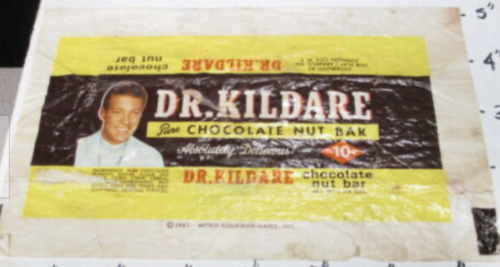
Dr. Kildare Chocolate Nut Bar
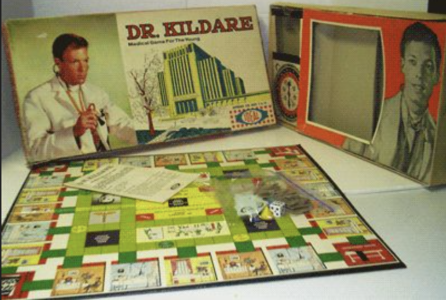
Dr. Kildare board game for ages 7 to 12
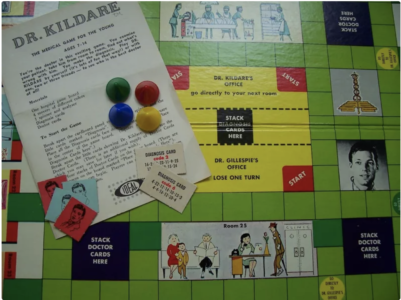
Dr. Kildare board game instructions and graphic of board
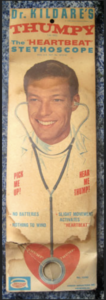
Dr. Kildare’s Thumpy the Heartbeat Stethoscope
Richard Chamberlain had a hit single that made the Top Ten on the Billboard Hot 100 in July 1962 titled “Theme from Dr. Kildare (Three Stars Will Shine Tonight)”. The single peaked at #7 in Vancouver in June 1962. In the fall of 1962, Chamberlain covered Elvis Presley’s 1956 number-one hit “Love Me Tender”, which climbed to #22 in Vancouver.
In 1962, Chamberlain appeared as a mystery guest in What’s My Line. He was also a presenter at the 34th Academy Awards. In early 1963, Chamberlain’s cover of the Everly Brothers number-one hit from 1958, “All I Have To Do Is Dream”, climbed to #12 in Vancouver. Concurrently, in Toronto Richard Chamberlain’s cover of “Hi-Lili Hi-Lo” climbed to #7. His next single release was “True Love”.
In the summer of 1963, Richard Chamberlain’s song “I Will Love You” was a Top 20 hit in Montreal, and a Top 30 hit in Ottawa. And in the winter of 1963, Chamberlain had a #2 hit in Montreal with “Blue Guitar”. The B-side was “They Long To Be Close To You”. Chamberlain’s B-side was covered as a breakout number-one hit for the Carpenters in 1970. “Blue Guitar” was from the film, Twilight of Honor. It featured Chamberlain in his first starring role opposite Claude Rains. The films’ poster exclaimed, “Richard Chamberlain as a fearless trial lawyer in a drama of love, courage and murder!” In 1963, Chamberlain won a Golden Globe Award for Best TV Star – Male for: Dr. Kildare.
In 1965, Chamberlain was a presenter at the Academy Awards. He made guest appearances on The Bob Hope Show, The Andy Williams Show, The Carol Burnett Show, The Sammy Davis Jr. Show, Perry Como’s Kraft Music Hall, The Joet Bishop Show, and The Eamonn Andrews Show.
In 1965, Richard Chamberlain sang the theme song for the film, Joy In the Morning.
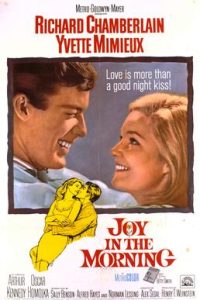
The plot of the film set in the late 1920s tells the story of a young newlywed couple, Carl and Annie Brown, who marry against their parents’ wishes while Carl is still in law school and struggle to maintain their relationship.
18-year-old Annie McGairy travels from Brooklyn to a college town in the Midwest to marry her law student boyfriend Carl Brown, at a courthouse. The newlyweds face disapproval from their parents, financial problems, and Annie’s sexual insecurities. Due to the marriage, Carl’s law school cuts off his loans, and his father cuts off support from home. This forces Carl to work multiple jobs on top of his studies. Annie causes gossip in the town by befriending a lonely, gay florist and babysitting for the mistress of a married businessman.
Annie learns she is pregnant. But before she can tell Carl, she has a heated argument about his night job that’s interfering with the couple’s intimacy. Annie leaves Carl and returns to her mother in Brooklyn, without telling Carl she is pregnant. Devastated by the loss of Annie, Carl’s schoolwork suffers and it looks like he’ll fail all his classes. When Carl’s father discovers the situation, including Annie’s now-obvious pregnancy, his attitude toward Annie softens. Carl’s father convinces the couple to reconcile. Annie helps Carl to catch up in his studies and pass his exams on the same day Annie gives birth. Carl graduates, and he and Annie celebrate a church wedding with family and friends. The movie ends with the couple happily riding away with their new baby son.
The title song, “Joy In The Morning”, began to chart in Calgary.
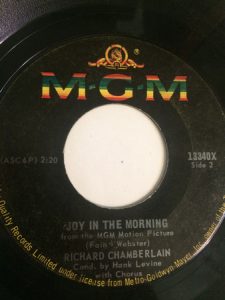
“Joy In The Morning” was written by Paul Webster and Sammy Fain. In 1902, Sammy Fain – born Samuel Feinberg – was born in New York City. In 1923, Fain appeared in the short sound film, Sammy Fain and Artie Dunn. In 1927, he wrote “Let a Smile Be Your Umbrella”, a #6 hit for Roger Kahn and his Orchestra. In 1930, he wrote “You Brought a New Kind of Love to Me”, introduced by Maurice Chevalier in the film The Big Pond. The song reached #3 in 1930 for Paul Whiteman. for In 1932, he appeared in the short film The Crooning Composer. In the early 30s, Sammy Fain wrote “When I Take My Sugar to Tea” (from the 1931 Marx Brothers movie Monkey Business), which peaked at #6 for the Boswell Sisters. “Was That the Human Thing To Do” was a Top Ten hit for both the Boswell Sister and for Bert Lown and his Orchestra in 1932. By a Waterfall” (from the 1933 film Footlight Parade), was a #6 hit for both Leo Reisman and Guy Lombardo. and the title song from the 1934 film Easy to Love.
In 1937, Fain wrote “That Old Feeling”. Shep Field and His Rippling Rhythm Orchestra had a number-one recording with the song on the Your Hit Parade chart for four weeks in October 1937. The song appeared in the 1937 film Walter Wanger’s Vogues of 1938.
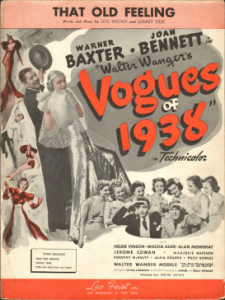
“That Old Feeling” was nominated for Best Original Song at the Academy Awards at the Biltmore Hotel in Los Angeles on March 10, 1938. In 1938, Fain wrote “I’ll Be Seeing You”, popularized in the 1944 film I’ll Be Seeing You. In 1938, “Who Blew Out the Flame” was a Top Ten hit for Larry Clinton and his Orchestra, as well as Dolly Dawn and her Dawn Patrol. Then in 1939, Lawrence Welk had a hit with Sammy Fain’s “The Moon is a Silver Dollar”.
In 1948, The Dickey Bird Song” was a Top Ten hit for Freddy Martin and his Orchestra. In 1949, his song “Dear Hearts and Gentle People” was successfully recorded by Dinah Shore and also Bing Crosby. In 1950, his song “I Can Dream, Can’t I” was a number-one hit for the Andrews Sisters. In 1953, Fain co-wrote with Paul Webster “Secret Love”, from the film Calamity Jane, which won Best Original Song at the 26th Academy Awards. At the 28th Academy Awards, Sammy Fain and Paul Webster won Best Original Song with “Love Is A Many Splendored Thing”. In 1958 he was nominated again (with Paul Francis Webster) for Best Original Song with “April Love”, the theme song for the film April Love. The following year, Fain was nominated once more (with Paul Webster) for “A Certain Smile”, from the movie A Certain Smile. In 1963, Fain received another Best Original Song nomination (with Paul Webster) for “Tender Is the Night”, from Tender Is the Night.
And in 1973, Sammy Fain (with Paul Webster) received yet another Best Original Song nomination for “Strange Are the Ways of Love” from The Stepmother. In 1976, Fain received his eighth Best Original Song nominated for “A World That Never Was” from Half A House. Then in 1977, he got another Best Original Song nomination for “Someone’s Waiting For You” from The Rescuers. Sammy Fain died in 1989 of a heart attack at the age of 87.
Paul Francis Webster was born in New York City in 1907. He worked on ships and later became a dance instructor at an Arthur Murray studio. In 1931 he wrote “Masquerade” which became a #3 hit the following year for Ted Black. And in 1933, “The Whisper Waltz” was a #6 pop hit for Rudy Vallee. In 1934, “Two Cigarettes In the Dark” was a Top Ten hit for four recording artists, and most successful for Johnny Green & His Orchestra which reached #2. In 1941, “I Got It Bad (and That Ain’t Good)” charted to #13 on the Billboard pop chart for Duke Ellington, with vocals by Ivie Anderson. In 1944, Webster received his first nomination for Best Original Song at the Academy Awards for “Remember Me to Carolina” from the film The Minstrel. In 1946, his song “Doctor, Lawyer, Indian Chief”, by Betty Hutton climbed to #1 on the pop charts in the USA. While in 1950, “The Loveliest Night of the Year” was a #3 hit for Mario Lanza. In 1954, “Blowing Wild” reached #2 on the UK Singles chart for Frankie Laine. And in 1955, “Honey Babe” peaked at #6 for Art Mooney. In 1956, Paul Webster wrote “The Twelfth of Never”, which became a Top Ten hit the following year for Johnny Mathis. It was an international Top Ten hit for Cliff Richard in 1964-65, and also a Top Ten hit for Donny Osmond in 1973.
In 1956, Paul Webster got an Academy Award nomination for “Friendly Persuasion (Thee I Love)” as sung by Pat Boone, from the film of the same name. In 1958, in addition to his nomination for “A Certain Smile”, Paul Webster earned a second Best Original Song nomination for “A Very Precious Love” from the film Marjorie Morningstar. In 1960, Webster earned another Best Original Song nomination with “The Green Leaves of Summer” from The Alamo. And in 1961, he was nominated in the same category for “Love Theme from El Cid (The Falcon and the Dove)”. While he scored two Best Original Song nominations in 1962 for “Love Song From Mutiny on the Bounty (Follow Me)”, as well as “Tender is the Night”. In 1963, Paul Webster received his eleventh Best Original Song nomination at the Academy Awards in eleven years with “So Little Time” from 55 Days in Peking. More Best Original Song nominations came in 1965 with “The Shadow Of Your Smile” (which he won) and in 1966 with “A Time For Love” from An American Dream. The song won a Grammy Award for Song of the Year.
In 1966, Paul Webster wrote lyrics to the theme from Doctor Zhivago, “Lara’s Theme”, which became a hit for the Ray Conniff Singers titled “Somewhere My Love”. In 1967, Webster wrote the theme song for the Spider-Man cartoon. In 1976, Paul Webster received his sixteenth Best Original Song nomination for “A World That Never Was” from Half a House. Paul Webster died at the age of 76 in 1984.
“Joy In The Morning” is a list-making song. In the film, the husband – Carl (Richard Chamberlain) – makes a list of promises of what he will give his recently married wife: 1) a sky full of bluebirds, 2) the lute of the laughter of children,
3) a gown made of lace from the willow, 4) a dream to keep under your pillow.
“Joy In The Morning” peaked at #9 in Calgary.
In 1966, Chamberlain was cast in a lead role opposite Mary Tyler Moore, and Larry Kert (Tony in 1957 Broadway production of West Side Story) in the Broadway production of Breakfast at Tiffany’s. However, after four previews at the Majestic Theatre at 245 W. 44th Street, the show closed. On a daily basis, the cast was given new material hours before curtain time, and the piece was overly long, running nearly four hours.
In 1969, Chamberlain starred with Katherine Hepburn in The Madwoman of Chaillot. As well, in 1969, he played in the role of Hamlet at the Birmingham Repertory Theatre.
In the 1970s, Richard Chamberlain was a guest on The Dick Cavett Show, The David Frost Show, Dinah’s Place, and The Mike Douglas Show. In 1971 he appeared opposite Glenda Jackson in the British film The Music Lovers. And in 1972, Chamberlain starred in another British film with Lawrence Olivier titled Lady Caroline Lamb. Other acting roles included The Three Musketeers and The Towering Inferno.
In the 1980s, Chamberlain began appearing in the 1980 mini-series Shōgun. In 1981, he won a Golden Globe award for Best Performance by an Actor in a TV-Series – Drama for: Shogun (1980). And in 1983, he won critical acclaim for his acting in another mini-series The Thorn Birds. In 1984, he won a Golden Globe award for Best Performance by an Actor in a Mini-Series or Motion Picture Made for TV for: The Thorn Birds (1983).
Later he appeared in the TV series The Bourne Identity (1988). On the movie screen, audiences saw Richard Chamberlain in starring roles in King Solomon’s Mines, and Allan Quatermain and the Lost City of Gold. In the latter film, one of the other stars – Martin Rabbett – was in a relationship with Richard Chamberlain from 1977 to 2010.
In 1993, Richard Chamberlain returned to Broadway in the musical production of My Fair Lady. And in 1998, Chamberlain played Captain Von Trapp in a Broadway production of The Sound of Music. He also made guest appearances in the TV shows Will & Grace and The Drew Carey Show.
In 2007, Chamberlain was cast in the comedy I Now Pronounce You Chuck & Larry. The film was a ‘buddy’ story about two New York City firefighters who pretend to be a gay couple in order to ensure one of their children can receive healthcare. However, things go from bad to worse when an agent decides to verify their story. Chamberlain’s co-stars included Steve Buscemi, Adam Sandler and Dan Aykroyd. And in 2011, Chamberlain appeared in the film The Perfect Family.
May 11, 2024
Ray McGinnis
References:
Steven McElroy, “At 80 Richard Chamberlain is Ready to Speak Volumes,” New York Times, November 30, 2014.
“Dr. Kildare (TV series)“, Wikipedia.org.
“Sammy Fain: Top Broadway and Hollywood Tunesmith for 60 Years,” Songwriters’ Hall of Fame.
“Paul Francis Webster: Top Hollywood Lyricist won three Oscars: His “Shadow of Your Smile” won both Grammy and Oscar for Best Song,” Songwriter’s Hall of Fame.
“Joy In The Morning – Trailer,” MGM, 1965.
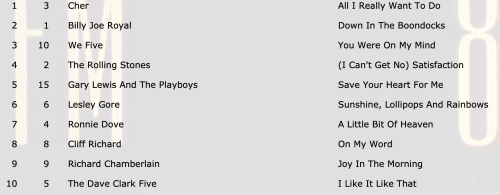
CFAC 960-AM Calgary (AB) Top Ten | August 2, 1965

Leave a Reply